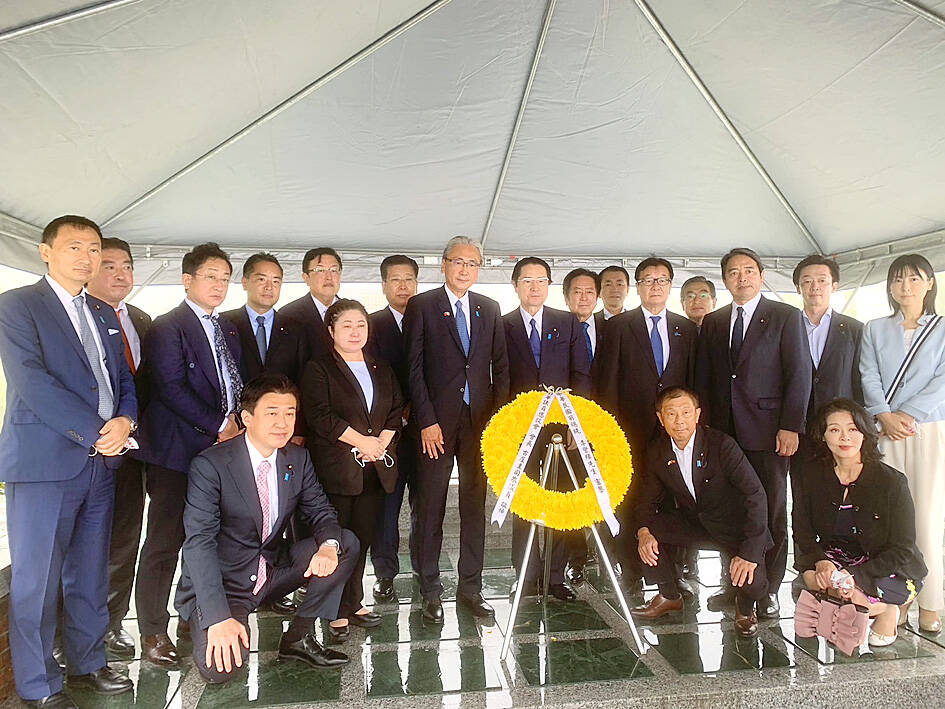A delegation of Japanese lawmakers yesterday visited the Wuchihshan Military Cemetery (五指山軍人公墓) in New Taipei City to pay tribute to former president Lee Teng-hui (李登輝).
The members of the Japanese House of Representatives and House of Councilors arrived in Taiwan on Saturday and are to attend the Double Ten National Day celebrations today.
Japanese House of Representatives member Keiji Furuya, chair of the Japan-ROC Diet Members’ Consultative Council, said the delegation’s visit to the cemetery is important, as Lee was not only Taiwan’s “Mr Democracy,” but also an important figure who has contributed to Taiwan-Japan relations.

Photo courtesy of the Lee Teng-hui Foundation
It was the first time many of the delegation have visited the cemetery, and they felt honored and excited, Furuya said.
As Lee Teng-hui Foundation chairperson Annie Lee (李安妮), Lee Teng-hui’s daughter, was attending to her mother, Tseng Wen-hui (曾文惠), at home, foundation executive director Cheng Mu-chun (鄭睦群) greeted the delegation on her behalf and presented them with a letter from her.
Annie Lee in the letter expressed her gratitude to the delegation and apologized for not being able to accompany them.
She also expressed her thoughts about Double Ten National Day.
After World War II, Taiwan came under the Republic of China’s (ROC) authoritarian rule, so National Day celebrations were not accepted by all Taiwanese in the past, as some viewed it as suppression, Annie Lee wrote.
After Taiwan went through democratization and localization, the ROC, which was once viewed by many as a foreign regime, became “Taiwan, ROC,” and more Taiwanese have been celebrating National Day from the heart, she said, adding that the nation has been showing more solidarity.
“This is one of the most important contributions my father made in pushing forward Taiwan’s democratization,” she wrote. “So, Double Ten National Day celebrations, which seem to have nothing to do with Lee Teng-hui, actually entail an important meaning.”
Legislative Speaker You Si-kun (游錫?) accompanied the delegation to Yilan County’s Suao Township (蘇澳), where the group tried to spot Japan’s Yonaguni Island in the distance.
You said the visit to Suao served to show Taiwan’s close proximity to Japan.
People from both countries have long had friendly interactions, which is also testament to the close ties between Taiwan and Japan, he said.
You quoted Furuya as saying that their trip to Yilan to look for Yonaguni, which lies about 110km from Taiwan proper, also verifies former Japanese prime minister Shinzo Abe’s remark that “a Taiwan emergency is a Japanese emergency.”
Japan and Taiwan are “as close as lips and teeth,” he said, adding that although delegation members could not see Yonaguni due to rain, they could “see it from their hearts.”

ANOTHER EMERGES: The CWA yesterday said this year’s fourth storm of the typhoon season had formed in the South China Sea, but was not expected to affect Taiwan Tropical Storm Gaemi has intensified slightly as it heads toward Taiwan, where it is expected to affect the country in the coming days, the Central Weather Administration (CWA) said yesterday. As of 8am yesterday, the 120km-radius storm was 800km southeast of Oluanpi (鵝鑾鼻), Taiwan’s southernmost tip, moving at 9kph northwest, the agency said. A sea warning for Gaemi could be issued tonight at the earliest, it said, adding that the storm is projected to be closest to Taiwan on Wednesday or Thursday. Gaemi’s potential effect on Taiwan remains unclear, as that would depend on its direction, radius and intensity, forecasters said. Former Weather Forecast

As COVID-19 cases in Japan have been increasing for 10 consecutive weeks, people should get vaccinated before visiting the nation, the Centers for Disease Control (CDC) said. The centers reported 773 hospitalizations and 124 deaths related to COVID-19 in Taiwan last week. CDC Epidemic Intelligence Center Director Guo Hung-wei (郭宏偉) on Tuesday said the number of weekly COVID-19 cases reported in Japan has been increasing since mid-May and surpassed 55,000 cases from July 8 to July 14. The average number of COVID-19 patients at Japan’s healthcare facilities that week was also 1.39 times that of the week before and KP.3 is the dominant

The Chinese Communist Party’s (CCP) working group for Taiwan-related policies is likely to be upgraded to a committee-level body, a report commissioned by the Mainland Affairs Council (MAC) said. As Chinese President Xi Jinping (習近平) is increasingly likely to upgrade the CCP’s Central Leading Group for Taiwan Affairs, Taiwanese authorities should prepare by researching Xi and the CCP, the report said. At the third plenary session of the 20th Central Committee of the CCP, which ended on Thursday last week, the party set a target of 2029 for the completion of some tasks, meaning that Xi is likely preparing to

US-CHINA TRADE DISPUTE: Despite Beijing’s offer of preferential treatment, the lure of China has dimmed as Taiwanese and international investors move out Japan and the US have become the favored destinations for Taiwanese graduates as China’s attraction has waned over the years, the Ministry of Labor said. According to the ministry’s latest income and employment advisory published this month, 3,215 Taiwanese university graduates from the class of 2020 went to Japan, surpassing for the first time the 2,881 graduates who went to China. A total of 2,300 graduates from the class of 2021 went to the US, compared with the 2,262 who went to China, the document showed. The trend continued for the class of 2023, of whom 1,460 went to Japan, 1,334 went to